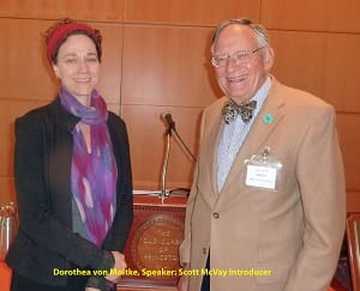October 5, 2011
Bookstores and the Fate of Humanities
Dorothea von Moltke
Co-owner, Labyrinth Books
Bookstores and the Fate of Humanities
Dorothea von Moltke
Co-owner, Labyrinth Books
Minutes of the Fourth Meeting of the 70th Year
This was the 4th meeting of the 71st year of the Old Guard of Princeton. The meeting was called to order by Bob Varrin.The Invocation was lead by Don Edwards. Minutes were read by John Lasley.. Guests were: Bradley Bucher, introduced by Arthur Eschenlauer, Hella Mc Vay, introduced by Scott McVay, and David and Ruth Scott, introduced by Charlie Ufford. Attendance was 117.
Jack Reilly, Membership chair, introduced the names of one emeritus, and 12 new members.
Scott McVay introduced the speaker, Dorothea vonMoltke, who delivered her topic, “Bookstores and the Fate of the Humanities” with extraordinary luminosity and distinction. There was no slide presentation; indeed, this was a book report, and one which placed the book-seller and by extension, the book, in the far vaster realm of the humanities. At stake in the preservation of this broader culture is the health of the arts, of the knowledge we hold within civil societies, and our function as human beings.
Why are the humanities in such fragile health? Fact: Americans watch 2 hours of television for every seven minutes of reading—and within each of those two hours lie 18 minutes of advertising. We need to truly consider differences within our culture today, i.e. the difference between knowledge and information and the difference between development and growth. We need the humanities in the form of books to stop moral obtuseness, to bring clarity and precision, and to create a society of active engagement rather than passive entitlement. Books take us out of the passive sphere and into the public one as inter-active human beings, not as “co-webbers.”
Foucault has said, “Books present direct experience to tear me from myself.” They promote centrality rather than specialization, the centrality of our cultural practices, and encourage our general and ample conversations with others.
Reading can be, ultimately, the best antidote to cultural amnesia, and books and their sellers remain at the center of the civilized sphere we are still optimistic enough to want to be in.
And remember: There is nothing fishy about the fact that the price of two lattes will still get you a good copy of Moby Dick!
Respectfully submitted,
Claire R. Jacobus
Jack Reilly, Membership chair, introduced the names of one emeritus, and 12 new members.
Scott McVay introduced the speaker, Dorothea vonMoltke, who delivered her topic, “Bookstores and the Fate of the Humanities” with extraordinary luminosity and distinction. There was no slide presentation; indeed, this was a book report, and one which placed the book-seller and by extension, the book, in the far vaster realm of the humanities. At stake in the preservation of this broader culture is the health of the arts, of the knowledge we hold within civil societies, and our function as human beings.
Why are the humanities in such fragile health? Fact: Americans watch 2 hours of television for every seven minutes of reading—and within each of those two hours lie 18 minutes of advertising. We need to truly consider differences within our culture today, i.e. the difference between knowledge and information and the difference between development and growth. We need the humanities in the form of books to stop moral obtuseness, to bring clarity and precision, and to create a society of active engagement rather than passive entitlement. Books take us out of the passive sphere and into the public one as inter-active human beings, not as “co-webbers.”
Foucault has said, “Books present direct experience to tear me from myself.” They promote centrality rather than specialization, the centrality of our cultural practices, and encourage our general and ample conversations with others.
Reading can be, ultimately, the best antidote to cultural amnesia, and books and their sellers remain at the center of the civilized sphere we are still optimistic enough to want to be in.
And remember: There is nothing fishy about the fact that the price of two lattes will still get you a good copy of Moby Dick!
Respectfully submitted,
Claire R. Jacobus

